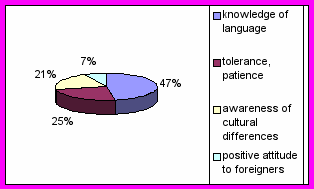Е. Ф. Тарасов главный редактор
| Вид материала | Документы |
Содержание6. Survey Results |
- Серия «Мастера психологии» Главный редактор Заведующий редакцией Ведущий редактор Литературный, 6744.57kb.
- 4-5 38—41 Методическая газета для педагогов-психологов. Выходит 2 раза в месяц Учредитель, 534.94kb.
- Методист кабинета общественных дисциплин арипк; А. В. Нашемук, 1313.16kb.
- Главный редактор Зав психологической редакцией Зам зав психологической редакцией Ведущий, 16568.8kb.
- М. Н. Кедров (главный редактор), О. Л. Книппер-Чехова, А. Д. Попов, Е. Е. Северин,, 7543.75kb.
- 7 ноября/понедельник, 345.99kb.
- -, 406.21kb.
- А. В. Федоров главный редактор, 1896.68kb.
- Тощенко жан Терентьевич член-корреспондент ран, главный редактор журнала "Социологические, 322.26kb.
- Предварительная программа, 64.81kb.
6. Survey Results
Let me provide a few illustrations from my questionnaire form. I have prepared some survey about intercultural communication problems among twenty two people: ten men and twelve women 22 – 45 years of age: my friends and a few other people (intercultural team) from my work - foreigners having lived in Germany for some years: from Spain, Italy, Greece, Turkey, Croatia, Ukraine, Denmark, England, Maroko, Korea, four people from Poland and six from Germany. According to the research presented during our classes, the results were various, but what is very interesting, in some cases also similar.
How do stereotypes influence the described concept? Can you find them in communication process and judging other people (especially other nationalities)? Sixteen persons had the same opinion about stereotypes, claiming that they disturb the effective communication process, and six of them said that play some role.
I have received their opinions on two nationalities: Polish and German. How are they perceived by?
Diagram 1.


One of the questions was: “Mention 3 words or expressions that you associate with Poles and Germans”. The answers I received were as follows: Germans – stiff, well organized, punctual, and not flexible for example in social and office services, Poles: thefts of cars, alcohol, hospitable, catholic nation, shrewd.
Next question: “What is the most important factor responsible for success and failure in the intercultural communication?” The conclusion is based on various spontaneous answers. Unfortunately at the first places are: language (47%) and tolerance (25%), the third position was taken by: knowledge and awareness of cultural differences (21%), and the last by: attitude towards foreigners.
H
 ow relevant is the language, what role does the language play in communication? “The knowledge of the language is the most important factor that contributes the misunderstanding situations”: 17 people were for and 5 were against, claiming that the language should be known very well not only on the communicative level, because it makes it easier to communicate, exchange opinions, come into closer contacts with others, make friends, understand intentions and wishes of other people. Eighteen persons claimed that English, as an intercultural language is not enough for effective communication, because as one person said: “it is the obligation to know the language of the county you live in very well. “What according to you is the main reason for it?” Not speaking the language limits, blocks people, limits their self confidence, prevents good knowing of “others” which creates many often wrong associations or opinions, and strengthens the role of stereotypes and generalisation.
ow relevant is the language, what role does the language play in communication? “The knowledge of the language is the most important factor that contributes the misunderstanding situations”: 17 people were for and 5 were against, claiming that the language should be known very well not only on the communicative level, because it makes it easier to communicate, exchange opinions, come into closer contacts with others, make friends, understand intentions and wishes of other people. Eighteen persons claimed that English, as an intercultural language is not enough for effective communication, because as one person said: “it is the obligation to know the language of the county you live in very well. “What according to you is the main reason for it?” Not speaking the language limits, blocks people, limits their self confidence, prevents good knowing of “others” which creates many often wrong associations or opinions, and strengthens the role of stereotypes and generalisation. According to the answer to the question: how relevant are this cultural features? Tolerance and awareness of cultural dissimilarities in the general context are very important-on the first place; third position was taken by: rules and norms, customs and religion were on the last place. The answers also include: the language, other regulations and rules. A Spanish man and a Greek girl mentioned willingness of integration and meeting new people.
That idea is one of the disparities in relation to other countries. People in Germany are very individual, unwilling to create contacts; try not to make too many friends. I don’t think it’s just because of their unwillingness, I thinks it comes from their mentality and behaviour. “What in your culture or your country makes the most difficulties in communicating with other nationalities? If you live abroad what are 3 most important differences you’ve noticed between the culture of the people in your country and the country you live in. The examples of cultural differences given by foreigners living in Germany were: Germans are materialists, much better organized than Italians, they are crude in comparison with Spaniards, Italians or Greeks, even Poles, they have prejudices and are noisy, they are wealthy, very individual, they like to complain, they are hurt-sincere, direct, curt and they create a very powerful nation.
Comparing some features that I observed in the intercultural marriages (the daily life of my sister and my friend married to a Marokiese man) I can say that although the language is a very important factor to discuss and to express own opinions and feelings with respect to the different culture (Polish and Danish) doesn’t create any obstacles in building a close, harmonious and full of understanding relationship. As my inquiry shows and confirms other cultural dimensions are much more relevant. Individual priorities and human values are the base for thinking and communicating between two people of different cultures. I have noticed that in this case, like in every happy relationship the most valuable issues are: the willingness to understand each other, tolerance and patience, being open for the partner and being ready to compromise, even while some complicated situations are quite hard to deal with.
However, sometimes it’s not only the customs that are the biggest obstacle in relationships. For two people of totally different cultures, Muslim and Catholic, there is something much more complicated. For Alice it was hard to accept some of Nori’s habits, for example: smacking during eating, or holding a fork in the right hand. She didn’t know much about Arabian culture and was looking through stereotypes. But her parents and family needed a full year to accept their daughter’s marriage.
These answers from my little research are the summary of my opinions and the confirmation of that what was said during our classes. Of course everything is very individual: for some people what is the most important is the values, for someone else the way of behaving - everyone acts according to their own priorities, rules and norms (25).
